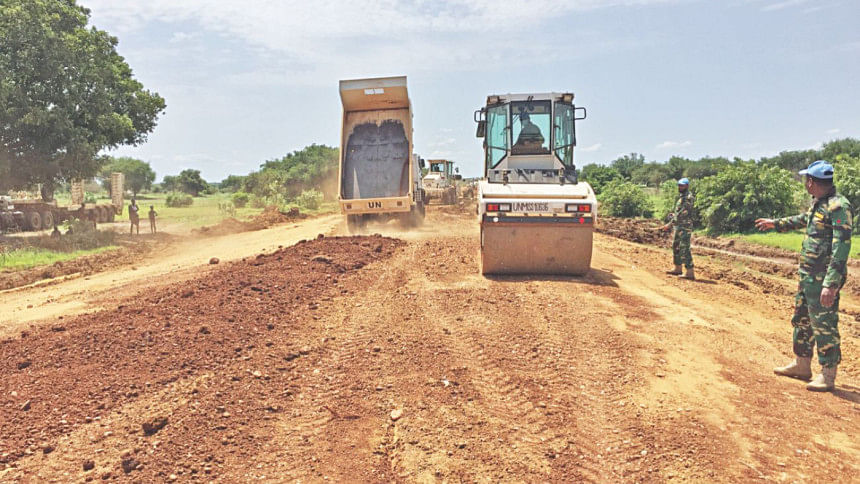Giving South Sudan a lifeline

Road communication is key to growth and development. But they are much more than that in South Sudan, which has been embroiled in a bloody civil war since its independence in 2011.
For many of the three million displaced people faced with famine and starvation, a single road could stand between life and death. A road -- probably in the truest sense -- is a lifeline for many.
A road means better chance of food and medicine reaching the famished villages. It means faster and more frequent arrival of relief materials, and the people building roads there are almost godsend to impoverished locals.
It is in a place like this -- rife with militia and bandits -- that sappers of Bangladeshi Engineering Corps have built part of a road that connects the capital Juba in the south with the central district of Rumbek.
Most of the 385km road between Juba and Rumbek that goes through Terakeka, Minkiman and Yirol, has no settlement on either side. The route is so dangerous that peacekeepers cannot move without a security convoy.
Despite the risks, Bangladeshi engineers have built 61km of road along that stretch, which is rather a mud track in some places.
The only human activity along this stretch is cowboys in tattered clothing and armed with AK-47 rifles, tending their herds.
“They (Bangladeshi Peacekeepers) are doing a very good job. They are professional and provide the best engineering support in the mission. They are the first in the mission,” Brig Gen He Xing, commander of South Sector, told The daily Star.
The Chinese military official said the road from Juba to Terakaka state was in a very bad condition; it was impossible for vehicles to move along it.
“This road is very important for the mission. It is a lifeline for the mission to send supplies from Juba to the northern part of the country. They have good equipment and professional manpower,” he commended the Bangladeshi peacekeepers as saying. “It is the Bangladeshi brand."
The peacekeepers have helped the mission build roads, bridges and camps. The one-star general said the engineers were also helpful to the local community, local government and also the government of South Sudan.
“They are winning the hearts of the people, and that benefits the UN mission,” Xing said.
With only about 100 people of the Bangladesh Army's engineering company, the sappers managed to build 61km of road within just two months. “It was not an easy task, as the raw materials have to be collected locally after convincing the people,” Lt Col Mohammad Tariqul Alam, Contingent Commander of Bangladesh Engineer-1, told The Daily Star.
The conflict in South Sudan has seen people flee their homes and has cut trade routes with neighbouring countries such as Uganda and Kenya.
Food prices have soared by 800 percent, putting it out of the reach of impoverished families. Thousands of refugees have fled to Uganda, seeking shelter.
The situation is so bad that 1kg rice costs the equivalent of Tk 700, while beef is only Tk 100 per kg. Fish is a luxury here, and clothes are beyond imagination. Weapons, however, are readily available.
The route is also important because international companies have started farming the barren fields. Yoash Zohar heads such a company, called the Green Horizon Project. According to him, the route is crucial to the economy of South Sudan.
“We are farming here,” Zohar said. The road was full of potholes and it took much effort to travel on this road. “But Bangladeshi peacekeepers have changed the scenario within just two months. It is a big improvement. It is a lifeline of the country. I hope the peacekeepers will continue their work," Zohar said with a smile.
Maj Muhammad Shoeb Shafiq, who was part of the first Bangladeshi peacekeeping mission in South Sudan in 2005, shared his experience with this correspondent during the visit.
“The road was full of bushes and potholes in 2005, and the width of the muddy road was hardly eight feet. The whole road was mined and we had to work risking our lives, as anything could happen," he remembered.
The ex-peacekeeper expressed his joy seeing the current condition of the highway. “It's my pride that our peacekeepers have changed the whole scenario of the road. People will remember Bangladesh forever for constructing the major lifeline route towards east of the country.”

 For all latest news, follow The Daily Star's Google News channel.
For all latest news, follow The Daily Star's Google News channel. 



Comments